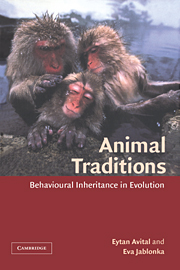Book contents
- Frontmatter
- Contents
- Preface
- Acknowledgements
- 1 New rules for old games
- 2 What is pulling the strings of behaviour?
- 3 Learning and the behavioural inheritance system
- 4 Parental care – the highroad to family traditions
- 5 Achieving harmony between mates — the learning route
- 6 Parents and offspring – too much conflict?
- 7 Alloparental care – an additional channel of information transfer
- 8 The origins and persistence of group legacies
- 9 Darwin meets Lamarck – the co-evolution of genes and learning
- 10 The free phenotype
- References
- Index of species
- Index of subjects
7 - Alloparental care – an additional channel of information transfer
Published online by Cambridge University Press: 28 October 2009
- Frontmatter
- Contents
- Preface
- Acknowledgements
- 1 New rules for old games
- 2 What is pulling the strings of behaviour?
- 3 Learning and the behavioural inheritance system
- 4 Parental care – the highroad to family traditions
- 5 Achieving harmony between mates — the learning route
- 6 Parents and offspring – too much conflict?
- 7 Alloparental care – an additional channel of information transfer
- 8 The origins and persistence of group legacies
- 9 Darwin meets Lamarck – the co-evolution of genes and learning
- 10 The free phenotype
- References
- Index of species
- Index of subjects
Summary
According to the Bible, the Lord commanded Moses to tell his people ‘Thou shalt love thy neighbour as thyself.’ Regrettably, most of us fall short of this high moral standard: the interests of friends and neighbours are usually not as close to our heart as our own interests. Although human beings often co-operate with each other, strikingly altruistic acts are far from being the rule. When we do encounter them, we tend to regard them with surprise, admiration and sometimes even with contempt, indicating that these acts are seen as something exceptional. Impressively altruistic acts, especially those that are not directed towards close relatives, are often thought of as biologically ‘unnatural’ – the result of ideals imposed on us by custom, law or God, or else the unfortunate outcome of some miscalculation. Biologists have therefore been extremely puzzled by the observation that many birds, mammals and even insects perform what seem like acts of self-sacrifice. They take risks by warning others of lurking predators; they fight, sometimes to the death, to protect other individuals; and they take upon themselves the onerous chore of caring for the young of others. In several hundred species of birds and mammals, from bee-eaters and kingfishers to jays and woodpeckers, from voles and mongooses to bats and marmosets, parents are helped to rear their offspring by other individuals who seem to surrender, at least temporarily, their own reproductive rights and opportunities, and become ‘helpers’.
- Type
- Chapter
- Information
- Animal TraditionsBehavioural Inheritance in Evolution, pp. 208 - 242Publisher: Cambridge University PressPrint publication year: 2000

